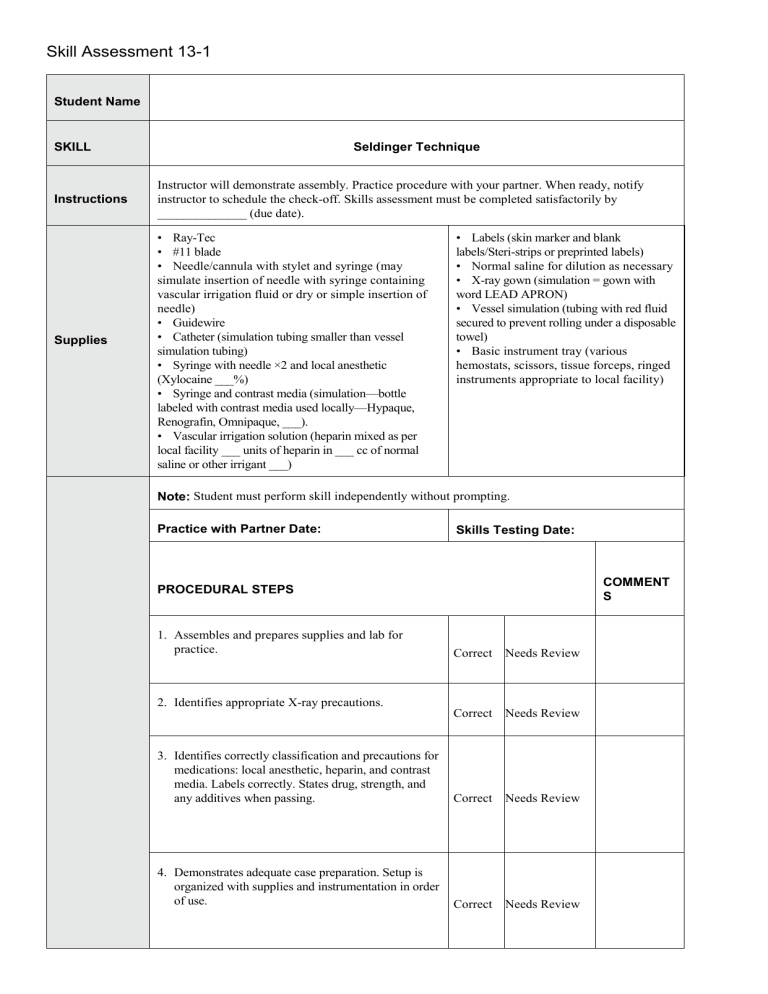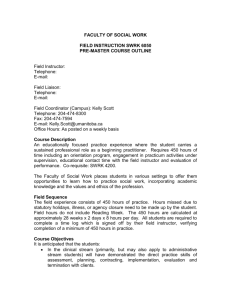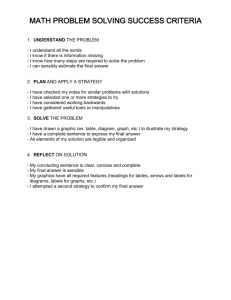Skill Assessment Chapter 13

Skill Assessment 13-1
Student Name
SKILL Seldinger Technique
Instructions
Supplies
Instructor will demonstrate assembly. Practice procedure with your partner. When ready, notify instructor to schedule the check-off. Skills assessment must be completed satisfactorily by
______________ (due date).
• Ray-Tec
• #11 blade
• Needle/cannula with stylet and syringe (may simulate insertion of needle with syringe containing vascular irrigation fluid or dry or simple insertion of needle)
• Guidewire
• Catheter (simulation tubing smaller than vessel simulation tubing)
• Syringe with needle ×2 and local anesthetic
(Xylocaine ___%)
• Syringe and contrast media (simulation—bottle labeled with contrast media used locally—Hypaque,
Renografin, Omnipaque, ___).
• Vascular irrigation solution (heparin mixed as per local facility ___ units of heparin in ___ cc of normal saline or other irrigant ___)
• Labels (skin marker and blank labels/Steri-strips or preprinted labels)
• Normal saline for dilution as necessary
• X-ray gown (simulation = gown with word LEAD APRON)
• Vessel simulation (tubing with red fluid secured to prevent rolling under a disposable towel)
• Basic instrument tray (various hemostats, scissors, tissue forceps, ringed instruments appropriate to local facility)
Note: Student must perform skill independently without prompting.
Practice with Partner Date: Skills Testing Date:
PROCEDURAL STEPS
1. Assembles and prepares supplies and lab for practice.
Correct Needs Review
COMMENT
S
2. Identifies appropriate X-ray precautions.
Correct Needs Review
3. Identifies correctly classification and precautions for medications: local anesthetic, heparin, and contrast media. Labels correctly. States drug, strength, and any additives when passing. Correct Needs Review
4. Demonstrates adequate case preparation. Setup is organized with supplies and instrumentation in order of use.
Correct Needs Review
5. Demonstrates safe preparation, handling, and passing of sharps. Correct Needs Review
6. Demonstrates anticipation of procedure sequence.
Passes local anesthetic, knife, hemostat, needle/cannula setup, guidewire, catheter, then contrast media (if angiography simulation).
Correct Needs Review
7. Maintains work area neat and organized.
Immediately retrieves free ends of suture and disposes in “trash bag.”
Correct Needs Review
8. Breaks down setup and stores appropriately.
Correct Needs Review
Performance
Evaluation
Criteria
• Assembled necessary supplies and equipment.
• Identified and safely passed each instrument/Asepto, which elicited grasp reflex for
“surgeon.”
• Demonstrated safe preparation and passing of pharmacy preparations (local, contrast media, and vascular irrigation solution).
• Demonstrated safe passing of sharps.
• Demonstrated knowledge of Seldinger technique and medications. Anticipated correctly each step of procedure.
• Demonstrated attention to detail—work area setup is completed, as instructed, and maintained in an organized, clean, and safe manner. If not, needs improvement with:
• Student prepared and performed procedure independently.
• Performed each step in appropriate sequence.
Rating
Overall Rating (Satisfactory; Must Redo; Fail):
Instructor
Comments
Student Signature
Instructor Signature
Skill Assessment 13-2
Date
Date
Student Name
SKILL Intraoperative Cholangiogram Technique
Instructions
Supplies
Instructor will demonstrate assembly. Practice procedure with your partner. When ready, notify instructor to schedule the check-off. Skills assessment must be completed satisfactorily by
____________ (due date).
• Ray-Tec
• Hook scissors or #11/#12 knife blade if open procedure
• Cholangiogram catheter and syringe of normal saline
• Syringe and contrast media (simulation—bottle labeled with contrast media used locally— Hypaque,
Renografin, Omnipaque, ___). Solution prepared full strength or half and half as directed by instructor.
• Labels (skin marker and blank labels/Steri-strips or preprinted labels)
• Normal saline
• X-ray gown (simulation = gown with word LEAD
APRON); identifies safeguarding of sterile field: half sheet for portable X-ray to cover field or C-arm drape if fluoroscopy used
• Hemoclip appliers or if simulated open procedure cystic duct clamp (T catheter clamp)
• Cystic duct/common bile duct simulation (tubing secured to prevent rolling)
• Basic instrument tray (various hemostats, scissors, tissue forceps, ringed instruments appropriate to local facility)
Note: Student must perform skill independently without prompting.
Practice with Partner Date: Skills Testing Date:
Correct Needs Review
COMMENT
S practice.
2. Identifies appropriate X-ray precautions.
Correct Needs Review
3. Identifies correctly classification and precautions for contrast media. Labels correctly. Prepares syringe with contrast media (no air bubbles—may look like a stone on X-ray). States drug and strength when passing.
Correct Needs Review
4. Demonstrates adequate case preparation. Setup is organized with supplies and instrumentation in order of use. Correct Needs Review
5. Demonstrates safe preparation, handling, and passing of sharps. Correct Needs Review
6. Demonstrates anticipation of procedure sequence.
Passes scissors/knife, hemoclip, catheter with saline setup to check placement and possible leakage, and if secure contrast media (no air bubbles). Identifies preparation of field to safeguard sterility during X-ray as used locally.
Correct Needs Review
7. Identifies next step if “obstruction” visualized on field: Prepare for CBDE (common bile duct exploration) or patient will be scheduled for ERCP
(endoscopic retrograde cholangiogram). CBDE needs choledochoscope, irrigation fluid, Fogarty catheter or stone basket, and T-tube with bile drainage bag postop.
Correct Needs Review
8. Maintains neat and organized work area.
9. Breaks down setup and stores appropriately.
Correct Needs Review
Correct Needs Review
Performance
Evaluation
Criteria
• Assembled necessary supplies and equipment
• Identified and safely passed each instrument/Asepto, which elicited grasp reflex for
“surgeon.”
• Demonstrated safe preparation and passing of pharmacy preparations (local, contrast media, and vascular irrigation solution)
• Demonstrated safe passing of sharps.
• Demonstrated knowledge of Seldinger technique and medications. Anticipated correctly each step of procedure.
• Demonstrated attention to detail—work area is set up as instructed and maintained in an organized, clean, and safe manner. If not, needs improvement with: .
• Student prepared and performed procedure independently.
• Performed each step in appropriate sequence.
Rating
Overall Rating (Satisfactory; Must Redo; Fail):
Instructor
Comments
Student Signature
Instructor Signature
Date
Date







